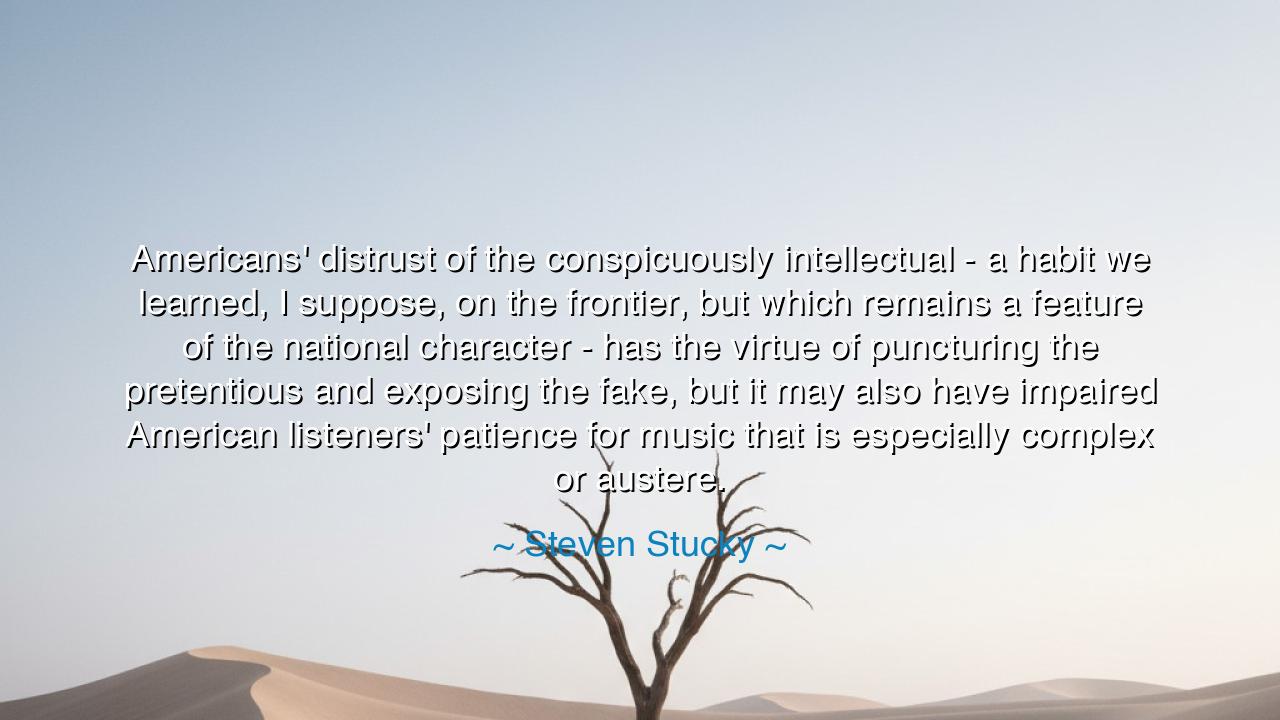
Americans' distrust of the conspicuously intellectual - a habit
Americans' distrust of the conspicuously intellectual - a habit we learned, I suppose, on the frontier, but which remains a feature of the national character - has the virtue of puncturing the pretentious and exposing the fake, but it may also have impaired American listeners' patience for music that is especially complex or austere.






Steven Stucky, composer and thinker, once reflected with piercing honesty: “Americans’ distrust of the conspicuously intellectual—a habit we learned, I suppose, on the frontier, but which remains a feature of the national character—has the virtue of puncturing the pretentious and exposing the fake, but it may also have impaired American listeners’ patience for music that is especially complex or austere.” In this declaration he unveils both the strength and the weakness of a cultural inheritance, one that shapes not only music but the very soul of a people.
The frontier, in Stucky’s vision, was a place where survival mattered more than theory, where action outweighed contemplation, where plain speech triumphed over elaborate words. It was there that Americans learned to distrust those who seemed too clever, too polished, too divorced from the grit of daily life. And from this suspicion grew a virtue: the ability to strip away the pretentious, to unmask falsehood, to demand honesty from leaders, teachers, and creators alike. This distrust protected the people from those who would use high-sounding words to mask corruption or deceit. In this way, it became part of the nation’s identity.
But as Stucky warns, every virtue has its shadow. That same suspicion of the intellectual can harden into impatience with true complexity, into dismissal of what requires slow attention and careful thought. In music, he laments, this means that works of great depth—those that are austere, intricate, or subtle—may find few willing ears. The people, shaped by a culture of pragmatism and plainness, may prefer the immediate and the accessible, turning away from art that demands patience and surrender. Thus the very trait that guards against falsehood can also close the door to beauty.
History echoes this paradox. Consider the philosopher Socrates, who in Athens was condemned for being too probing, too questioning, too “conspicuously intellectual.” The people admired their poets and warriors but grew suspicious of the man who asked them to think more deeply than they wished. They accused him of corrupting the youth, when in truth he was attempting to awaken them. Their impatience with the complex led to the silencing of one of history’s greatest minds. Just so, Stucky suggests, impatience with art may rob a people of treasures they did not have the endurance to explore.
Yet it is not only in music or philosophy that this lesson resounds. In every sphere of life, the tension between distrust of the pretentious and openness to the complex must be held with care. To question those who would deceive is wisdom; to scorn all who speak with depth is folly. To seek clarity is noble; to demand only simplicity is impoverishing. The wise must learn to discern the difference: between arrogance and truth, between fake brilliance and genuine insight.
The lesson, O seekers, is twofold. First, honor the American instinct to strip away falsehood. Let your ears and hearts remain guarded against those who would dazzle with empty cleverness. But second, cultivate patience for what is difficult, whether in art, in thought, or in life. Do not turn away simply because a song is strange, a poem obscure, or a truth hidden beneath layers of complexity. For often it is in the austere, the demanding, the slow, that the richest treasures are found.
Therefore, remember Stucky’s wisdom: distrust can protect, but it can also blind. Use it as a shield against the fake, but not as a wall against the profound. Train your mind to sit quietly with difficulty, train your ear to endure the unfamiliar, train your heart to seek meaning beyond the obvious. For in this balance lies the path of true wisdom, where honesty and depth walk together, and the soul learns not only to survive the frontier, but to flourish beyond it.






AAdministratorAdministrator
Welcome, honored guests. Please leave a comment, we will respond soon